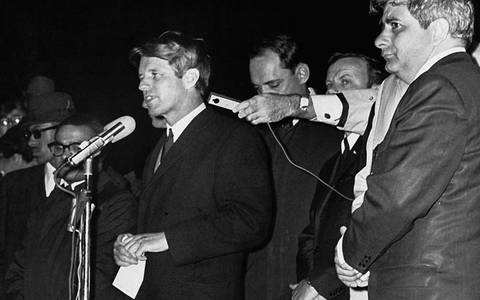Against outcries of pain and anger, he calmed those assembled, quoting Aeschylus. “My favorite poet was Aeschylus,” he said. “He once wrote: ‘Even in our sleep, pain which cannot forget falls drop by drop upon the heart, until, in our own despair, against our will, comes wisdom through the awful grace of God.’”

That night, Indianapolis was the only city in the U.S. with a major African-American population that did not burn. I consider this a humanities moment: when a lesson from the classics offered context and understanding to a people in overwhelming shock and pain.
Humanities’ investigations and revelations concern the most crucial elements of human experience—love and loss, beauty and truth, right and wrong, joy and despair, meaning and emptiness. Whether we reflect on our personal or our national history, it is these moments that are most resonant, to which we continually return to mark who we are as individuals and as a culture.
It is troubling, then, to hear prominent politicians, including some presidential candidates, dismiss the liberal arts as a “road to nowhere” or to suggest that the purpose of our universities is little more than “to meet the state’s workforce needs.” To those who argue the humanities cannot cure cancer, cannot win a war against terrorists or increase your paycheck and therefore should take a back seat to those enterprises that can, consider the following: Without the ability to listen carefully and engage with a patient’s narrative—in other words, to take a good case history—early detection and prevention of many cancers do not occur.
And for those who must endure treatment or make critical decisions regarding how they live and sometimes how they die, humanities touchstones matter as much as chemical interventions.
Consider the History
As for the war on terror, had those who occupied the White House in 2003 more attentively considered the history of Iraq and its neighbors, would we be fighting ISIS today? Kenneth Burke wrote of literature as providing “equipment for living.” Indeed, humanities skills offer a multifaceted and adaptable toolbox for navigating career shifts and changing workforce demands. And it is a statistical fact that liberal arts majors earn more during their lifetimes.
The all-too-common framing of a choice between liberal arts, for which the humanities are basic, and the so-called STEM—Science, Technology, Engineering and Math—programs presents us with a false binary and masks the fact that the number of majors in both the physical sciences and mathematics have diminished more rapidly than those in the humanities. Yet many institutions of higher learning have seized upon this one-dimensional trajectory, failing to recognize that humanities and STEM disciplines are complementary, necessary to each other’s sustenance and application.
Absent a humanities perspective, solutions to environmental degradation, climate change, immigration, geopolitical cataclysms and the implementation of new technologies will remain incomplete. Technology cannot assess the multiple masks of evil, the complicated ethics of choice or the frustrations and celebrations our yearning to be both human and more than human.
Humanities moments occur daily in the lives of every human being. They are the unexpected miracles that provide meaning, sharpen purpose, and offer depth—profound pauses in the otherwise frantic and self-absorbed scurrying that characterizes our gettings and spendings. They are portals of cognizance into what Thoreau termed “the meteorological journal of the mind.” They puncture routine forecasts, thunder into impossibility, convert boundaries to cloudscapes, or intensify focus with a cleansing rain.
When the personal harmonizes with the collective, the anomalous with the essential, humanities moments occur. When we recognize their exquisite and resounding centrality, we better understand the foundation of the democratic society of which they are a product.
Deprived of the Physical
My late friend, Brooke Hopkins, understood these notions intimately. Brooke was a scholar of Romantic poetry, a magnificent teacher and an intrepid outdoorsman. In 2008, shortly after retiring from the University of Utah, he was gleefully riding a new bicycle down City Creek Canyon in Salt Lake City. He suddenly came upon another rider and, in the subsequent collision, was paralyzed from the neck down. Many of us thought Brooke would not want to live within a body deprived of his basic physical enjoyments, let alone the ability to breathe on his own.
Given that his wife, philosopher Peggy Battin, had long written arguments advocating assisted suicide, we assumed they would decide to end his life.
One evening at his bedside in the ICU, clarinetist and cellist friends played Gabriel Faure’s Pavane, Opus 50, a hauntingly beautiful piece that takes its rhythm from the slow processional Spanish court dance of the same name. When they were finished, they heard sounds from Brooke. Unable to speak or clap, he was applauding them by clicking his tongue. Such fundamental praise.
Brooke always had tried to live exceptionally, at extremes, not between them. Now he was imprisoned in a horribly unexpected and undesired extreme.
“How do I live exceptionally now?” he seemed to ask. He ultimately decided to live and return to teaching. Each semester he chose a text—the Aeneid, Moby Dick, Shakespeare’s sonnets, Walden—and held class from the elaborate wheelchair in his home. Through hours of grueling therapy, he trained himself to go off his ventilator for longer periods, to speak in a halting voice to students who literally sat at his feet in admiration. Taking instruction from his literary models and disseminating their wisdom by his own courageous example, Brooke lived exceptionally for five more years before deciding his time had come.
His epitaph, taken from Henry Adams, reads: “A teacher affects eternity; he can never tell where his influence stops.”
This essay originally appeared in The News & Observer, December 20, 2015.